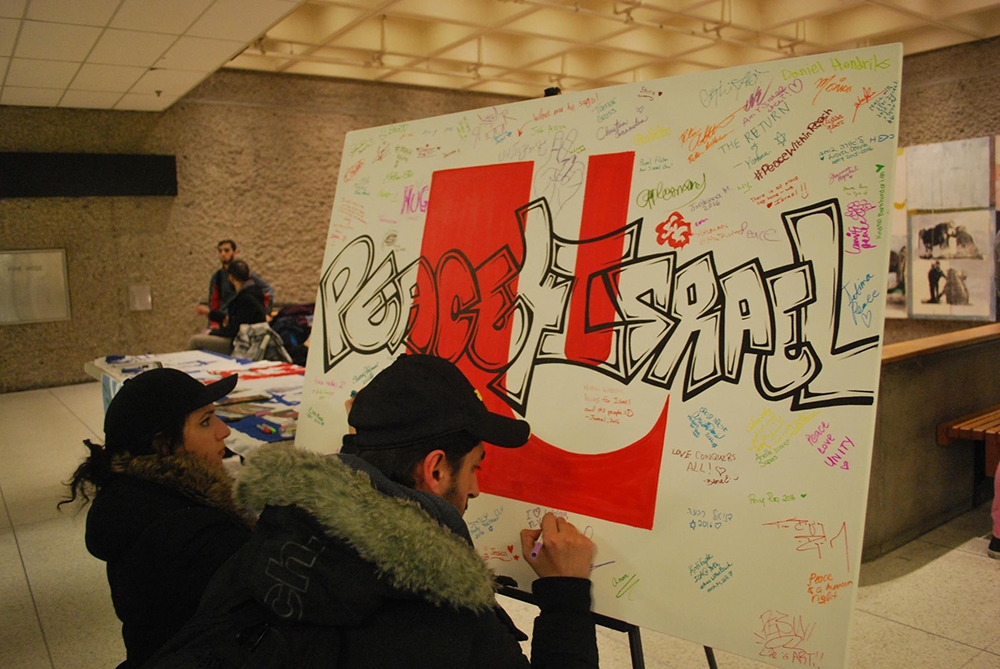Alex Kvaskov | Contributor
Featured image courtesy of Ariella Sibony
York’s Inclusion Committee and President and Vice-Chancellor Mamdouh Shoukri have come under sustained attack by national media in recent weeks, as Jewish organizations allege the committee is “stacked” with anti-Israel faculty.
In an interview with the Canadian Jewish News, or CJN, Shoukri said inclusion is a broad campus issue, and the committee’s membership needs to reflect that breadth.
“To be clear, this committee was not formed as a result of any specific incident, but rather to bring together York scholars to advance our shared goals of strengthening York’s commitment to building an inclusive and diverse campus through collegial dialogue that nurtures the respectful exchanges of ideas, and supports and prepares our graduates for success anywhere,” said Shoukri to CJN.
Not everyone is convinced.
Rena Silver, president of Hasbara at York, says the Inclusion Committee not only consists of a majority of individuals with anti-Israel leanings, but also includes some outright hateful individuals.
“I was privileged to attend a meeting with a couple of administrators for Jewish campus leaders recently where it seemed York’s administration understood that there is no way this committee can be effective at dealing with anti-Semitism on campus,” she adds.
She hopes for a vetting process and the inclusion of campus leaders “who know best that line between legitimate discourse of the state of Israel and anti-Semitism.”
Following his interview, several Jewish groups sent Shoukri an open letter calling for the removal of members “with a record of publicly promoting BDS and other anti-Israel initiatives.”
“We were disappointed to see comments that we felt were condescending to the concerns of our community and dismissive of the concerns of our students,” reads the letter.
The letter acknowledges Shoukri’s “commitment to combat bigotry and enhance inclusion” and claims York administration under Shoukri has failed to address a “growing sense of alienation among Jewish students on campus.”
“We remain alarmed by the seeming disregard of York University’s administration to recognize and confront anti-Semitism on campus,” it states.
The groups were also “astonished to learn that almost half of the members appointed to the inclusion committee either support boycotts, divestment and sanctions (BDS) or have been publicly critical of Israel.”
The letter was signed by B’nai Brith of Canada, The Centre for Israel and Jewish Affairs, Friends of Simon Wiesenthal Center, Hasbara Fellowships Canada, Hillel Ontario, StandWithUs Canada and UJA Federation of Greater Toronto.
“These organizations may represent their members, but in no way can they claim to represent, or speak for, all Jewish communities,” reads a letter co-signed by Independent Jewish Voices Canada, Toronto and York chapters, International Jewish Anti-Zionist Network – Canada, United Jewish People’s Order Canada and YorkU Jews Against Colonialism.
“The Centre for Israel and Jewish Affairs (CIJA)’s statement assumes that ‘anti-Israel activism’ is equivalent to anti-Semitism, which diverts the focus away from criticism of the Israeli government’s record of human rights violations and breaches of international law,” says Samuel B. Halévy, spokesperson for Independent Jewish Voices York.
“Independent Jewish Voices’ presence on campus, which is comprised of Jewish and non-Jewish students working together, is evidence that inclusion is possible outside of political Zionist-led narrative,” he adds.
Groups such as CIJA do not represent the entirety of the Jewish population, as there are other Jewish-led groups, both on- and off-campus, that understand the Israeli government’s motives and advocate for the human rights of Palestinians and equality of all peoples in the region, says Halévy.
Shoukri said this “discrepancy” of views in the Jewish community is because there are students and faculty at York who support the Palestinian causes and who are critical of policies of the State of Israel.
“Some of this criticism is part of a legitimate political dialogue, while part of it can be seen by some as a cover for anti-Semitic sentiment,” he said.
While York is in a good position to protect and support academic freedom and freedom of expression, and to draw the line when it comes to hate or other forms of discrimination or intimidation, the emotional aspects of an issue may affect some students and can make them feel uncomfortable or unsafe, according to Shoukri.
“[T]he mostly unfair targeting of York by several Jewish organizations and individuals – perhaps in their zeal to combat anti-Semitism, which I can understand – has had a negative effect on some of our young students and has contributed to making them feel worried and victimized,” he added.
Previously, Shoukri said that while acting within the limits of the law, vigorous yet respectful dialogue and exchange of ideas can be deeply enriching to the academic life of an institution.
“I believe it is the responsibility of those with strong views on any debate to act in a way that does not demonize and threaten others or make others feel unsafe,” he said.
Indeed, the balance between freedom of expression and ensuring that all members of a community feel safe in sharing their views without intimidation is a subject worthy of discussion in a collegial environment, according to Shoukri.
“We have zero tolerance for anti-Semitism or other forms of racism, or the advocacy of hate and violence by any group or individual,” he added, “however, it is understandable that there will be individuals who may feel challenged by some ideas.”




